Storozhynets
Storozhynets (Ukrainian: Сторожинець, pronounced [storoˈʒɪnetsʲ]; see below) is a small city located in Chernivtsi Oblast of western Ukraine, north of the border with Romania. It is the administrative center of Storozhynets Raion and is located approximately 20 km (12 mi) south-west of the oblast capital, Chernivtsi. Population: 14,197 (2015 est.)[2]
Storozhynets Сторожинець Storojineț | |
|---|---|
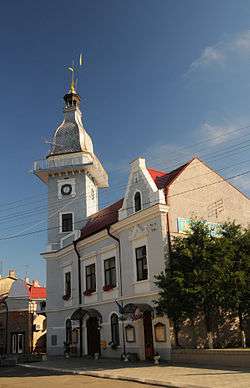 City hall | |
 Flag 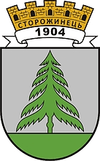 Coat of arms | |
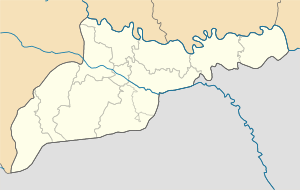 Storozhynets 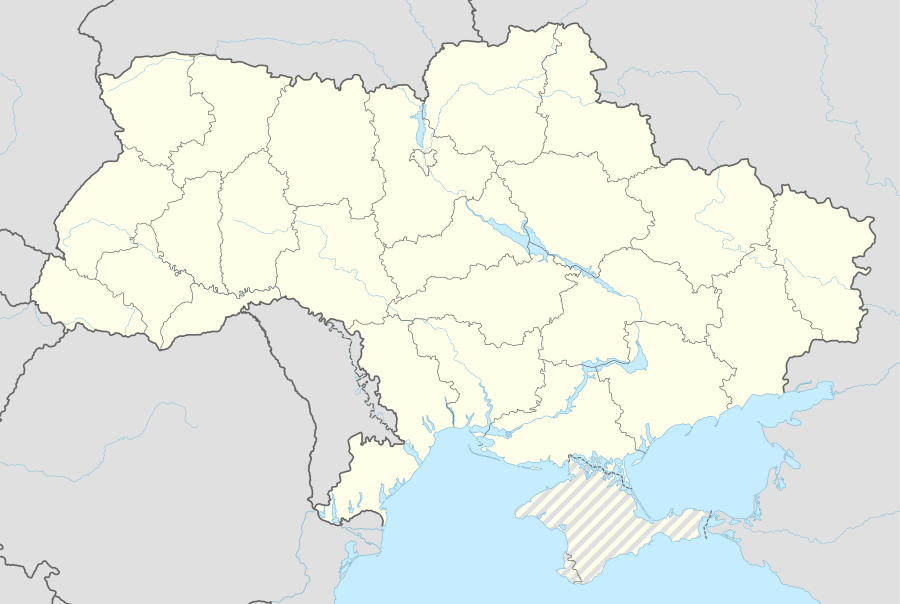 Storozhynets | |
| Coordinates: 48°09′35″N 25°42′54″E | |
| Country | |
| Oblast | |
| Raion | Storozhynets Raion |
| First mention | 1448 |
| Government | |
| • Mayor | Iryna Poraïko |
| Area | |
| • Total | 5,8 km2 (22 sq mi) |
| Elevation | 366 m (1,201 ft) |
| Population (2019) | |
| • Total | 14,198[1] |
| • Density | 2,501/km2 (6,480/sq mi) |
| Time zone | UTC+2 (EET) |
| • Summer (DST) | UTC+3 (EEST) |
| Postal code | 59000 — 59004 |
| Area code(s) | +380 3735 |
Chernivtsi–Berehomet line | |||||||||||||||||||||||||||||||||||||||||||||||||||||||||||||||||||||||||||||||||||||||||||||||||||||||||||||||||||||||||||||||||||||||||||||||||||||||||||||||||||||||||||||||||||||||||||||||||||||||||||||||||||||||||||||||||||||||||||||||||||||||||||||||||||
|---|---|---|---|---|---|---|---|---|---|---|---|---|---|---|---|---|---|---|---|---|---|---|---|---|---|---|---|---|---|---|---|---|---|---|---|---|---|---|---|---|---|---|---|---|---|---|---|---|---|---|---|---|---|---|---|---|---|---|---|---|---|---|---|---|---|---|---|---|---|---|---|---|---|---|---|---|---|---|---|---|---|---|---|---|---|---|---|---|---|---|---|---|---|---|---|---|---|---|---|---|---|---|---|---|---|---|---|---|---|---|---|---|---|---|---|---|---|---|---|---|---|---|---|---|---|---|---|---|---|---|---|---|---|---|---|---|---|---|---|---|---|---|---|---|---|---|---|---|---|---|---|---|---|---|---|---|---|---|---|---|---|---|---|---|---|---|---|---|---|---|---|---|---|---|---|---|---|---|---|---|---|---|---|---|---|---|---|---|---|---|---|---|---|---|---|---|---|---|---|---|---|---|---|---|---|---|---|---|---|---|---|---|---|---|---|---|---|---|---|---|---|---|---|---|---|---|---|---|---|---|---|---|---|---|---|---|---|---|---|---|---|---|---|---|---|---|---|---|---|---|---|---|---|---|---|---|---|---|---|
| |||||||||||||||||||||||||||||||||||||||||||||||||||||||||||||||||||||||||||||||||||||||||||||||||||||||||||||||||||||||||||||||||||||||||||||||||||||||||||||||||||||||||||||||||||||||||||||||||||||||||||||||||||||||||||||||||||||||||||||||||||||||||||||||||||
Storozhynets is located in the historic region of Bukovina, which has been governed by Moldavia (before 1774), the Austrian empire (1774–1918), Romania (1918–1940 and 1941–1944), the USSR (1940–1941 and 1944–1991) and Ukraine (since 1991).
Other names
Other names for the city include:
- Storozynetz (German)
- Storojineț (Romanian)
- Strozhnitz סטראָזשניץ - (Yiddish)
- Storožynec (Slovak)
- Storożyniec (Polish)
- Storozhinets (Сторожинец - Russian)
History
Storozhynets was a part of the Principality of Moldavia and was first mentioned in 1448. The first inhabitants were a settlement of loggers. In 1774 Austria added the Duchy of Bukovina to its territories. It was marked with great changes as Austrians and Germans arrived en masse. There were schools with German, Romanian, and Ukrainian as their languages of instruction.
Since the second half of the 19th century, a rapid population growth began with the arrival of Jews to the city, as well as Hungarian and Romanian businessmen, legal and banking officials most of whom were Jews. In 1854 Storozhynets received the status of city. By the end of the 19th century and early 20th century, the city was populated mainly by Jews.
In 1903 in Storozhinets opened a private school. In May 21, 1904 Storozhynets became a county. Trade, industry, agriculture, science, education and culture have developed a rapid pace.
But after World War I, its territory ended with a new status as Northern Bukovina became part of the Kingdom of Romania. In 1921, Romanian became the official language, and Ukrainian language was not used any more in the administration.
In 1940, 28 June, Northern Bukovina was occupied by the Soviet troops. After the start of the war against the Soviet Union, in 1941 Northern Bucovina was reintegrated into the Kingdom of Romania.
Between 1941 - 1943 a great part of the Jewish population was killed or deported to concentration camps in Transnistria.
Demographics
1930 Romanian Census
- Romanians 3,390 (38.98%)
- Jews 2,480 (28.52%)
- Polish 1,017 (11.69%)
- Ruthenians/Ukrainians 853 (9.81%)
- Germans 655 (7.53%)
Total 8,695
Famous people
- Iancu Flondor
- Rabbi Shulem Gershon Ginsburgh the last Rabbi of Strozhnitz, he was the son in law of Rabbi Yisroel Yaakov of Chust.
- Grand Rabbi Yisochor Ber Rosenbaum of Strozhnitz, author of Divrei Yisochor (d. 1980), son of Rabbi Issomor Rosenbaum of Nadvorna, son-in-law of Rabbi Yisachar Bertchi Leifer of Nadvorna-Satmar.
- Rabbi Yitschok Yaakov Dovid Hager of Strozhnits, son of Imrei Boruch of Vizhnitz
Gallery
 St Anne's Catholic church
St Anne's Catholic church St George Orthodox church
St George Orthodox church Storozhynets synagogue
Storozhynets synagogue Storozhynets dendropark
Storozhynets dendropark Historical Flag of Bukovina
Historical Flag of Bukovina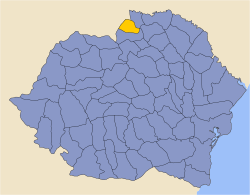 Storojinet County within Romania, 1930
Storojinet County within Romania, 1930
See also
References
- Чисельність наявного населення України на 1 січня 2019 року. Державна служба статистики України. Київ, 2019. стор.79
- "Чисельність наявного населення України (Actual population of Ukraine)" (PDF) (in Ukrainian). State Statistics Service of Ukraine. Retrieved 1 July 2016.
External links
- History of the Jews in Bukovina(German: Geschichte der Juden in der Bukowina)
- Storozhynets Jews Memorial Web Page